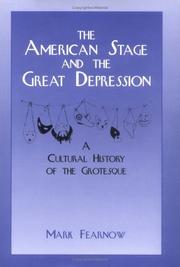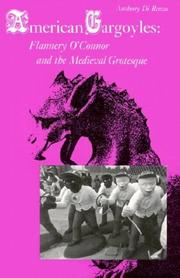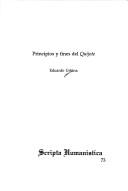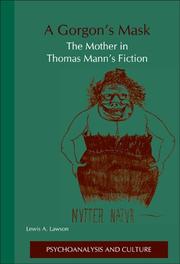| Listing 1 - 10 of 23 | << page >> |
Sort by
|
Book
ISBN: 9023218736 9789023218739 Year: 1982 Volume: 11 Publisher: Assen Van Gorcum
Abstract | Keywords | Export | Availability | Bookmark
 Loading...
Loading...Choose an application
- Reference Manager
- EndNote
- RefWorks (Direct export to RefWorks)
Thematology --- Grotesque in literature. --- Grotesque in literature
Book
ISBN: 1443850942 9781443850940 9781443848640 1443848646 1299765416 Year: 2013 Publisher: Newcastle upon Tyne Cambridge Scholars Publishing
Abstract | Keywords | Export | Availability | Bookmark
 Loading...
Loading...Choose an application
- Reference Manager
- EndNote
- RefWorks (Direct export to RefWorks)
World
Grotesque in literature. --- Satire --- History and criticism.
Book
ISBN: 1443875813 1336096632 9781336096639 9781443875813 1443870544 9781443870542 Year: 2015 Publisher: Newcastle upon Tyne, England : Cambridge Scholars Publishing,
Abstract | Keywords | Export | Availability | Bookmark
 Loading...
Loading...Choose an application
- Reference Manager
- EndNote
- RefWorks (Direct export to RefWorks)
This seminal book examines the dramatic implications of the grotesque in Romantic aesthetics. There are currently no book-length studies exploring the drama of the Romantic grotesque, a category that accentuates multiplicity and hybridity. The post-Kantian philosophy backing Friedrich Schlegel's Romantic irony provides the most decisive rationalisation of this plurality through theatrical play, and forms the theoretical framework for this study. Poetry and philosophy are merged in Schlegel's attempt to create Romantic modernity out of this self-conscious blurring of inherited perspectives and genres - a mixing and transgressing of past demarcations that simultaneously create the condition of the Romantic grotesque. The other writers examined in this book include A. W. Schlegel, Stendhal, Victor Hugo, and Baudelaire. The primary question is: how is the grotesque used to re-evaluate notions of aesthetic beauty? An answer emerges from a study of those thinkers in Schlegel's tradition who evolve a modern, ironic regard for conventional literary proprieties. Furthermore, how does the grotesque rewrite ideas of poetic subjectivity and expression? Here, Back and Forth foregrounds the enormous importance of Shakespeare as the literary example supporting the new theories. Shakespearean drama, which crosses aesthetic borders, legitimises the grotesque while reflecting the blood and gore of a post-Revolutionary Europe. Consequently, in reviewing hybrid texts like the Schlegelian fragments, Stendhal's Racine et Shakespeare, Hugo's Préface de Cromwell, and Baudelaire's De L'Essence du Rire, this book uses theories of continental Romanticism to reposition the significance of a vitally radical English aesthetic. Through this, Back and Forth claims that the Romantic revisioning of the Shakespearean grotesque helps create the ideas of post-Revolutionary modernity that are crucial to the larger projects of European Romanticism, and the ideas of modernity emerging from them.
Grotesque in literature. --- Literature, Modern --- History and criticism.

ISBN: 0521561116 Year: 1997 Publisher: Cambridge Cambridge University Press
Abstract | Keywords | Export | Availability | Bookmark
 Loading...
Loading...Choose an application
- Reference Manager
- EndNote
- RefWorks (Direct export to RefWorks)
American drama --- Depressions in literature. --- Depressions --- Grotesque in literature. --- Theater --- History and criticism. --- History
Book
ISBN: 9781108771658 1108807992 1108771653 1108488692 9781108488693 9781108738644 Year: 2020 Publisher: Cambridge Cambridge University Press
Abstract | Keywords | Export | Availability | Bookmark
 Loading...
Loading...Choose an application
- Reference Manager
- EndNote
- RefWorks (Direct export to RefWorks)
Roman elegy makes frequent use of themes of ugliness and disfigurement, juxtaposing them with images of ideal beauty and sentiment. In order to overcome the obstacles to his erotic relationship, the poet-lover repeatedly represents his rivals and opponents in such a way as to ridicule their appearance and to degrade their social standing. This book explores the theme of corporeal, intellectual, and social degradation from a perspective attentive to the aesthetic significance of the grotesque imagery with which such degradation is accomplished. Although there has been sophisticated discussion of the use of grotesque imagery in genres like comedy, invective, and satire, which are concerned in part with themes of transgression and excess, Mariapia Pietropaolo demonstrates that the grotesque plays a significant role in the self-definition of love elegy, the genre in which it is least expected.
Elegiac poetry, Latin --- History and criticism --- E-books --- Grotesque in literature. --- History and criticism.

ISBN: 0511007736 9780511007736 0521561116 Year: 1997 Volume: [6] Publisher: Cambridge New York Cambridge University Press
Abstract | Keywords | Export | Availability | Bookmark
 Loading...
Loading...Choose an application
- Reference Manager
- EndNote
- RefWorks (Direct export to RefWorks)
The American Stage and the Great Depression: A Cultural History of the Grotesque proposes a correlation between the divided "mind" of America during the depression and popular stage works of the era. Theatre works such as Jack Kirkland's comic-horrific adaptation of Tobacco Road, Olsen and Johnson's "scream-lined revue," Hellzapoppin, and successful plays by Robert E. Sherwood, Clare Boothe Luce, and S.N. Behrman are interpreted as theatrical reflections of depression culture's sense of being trapped between a discredited past and a nightmarish future. The author analyzes the America of the 1930s as an era of the "grotesque," in which the irreconcilable were forced into tense and dynamic coexistence, and by examining these works of theatre as products of particular historical circumstances, argues for a strong connection between cultural history and theatre history.
American drama --- Depressions --- Theater --- Depressions in literature. --- Grotesque in literature. --- Depressions in literature --- Grotesque in literature --- English --- Languages & Literatures --- American Literature --- Commercial crises --- Crises, Commercial --- Economic depressions --- Business cycles --- Recessions --- American literature --- History and criticism. --- History --- History and criticism

ISBN: 058502958X 9780585029580 0809320304 Year: 1995 Publisher: Carbondale Southern Illinois University Press
Abstract | Keywords | Export | Availability | Bookmark
 Loading...
Loading...Choose an application
- Reference Manager
- EndNote
- RefWorks (Direct export to RefWorks)
Focusing on the comic genius of Flannery O'Connor, Anthony Di Renzo reveals a dimension of her work that has been overlooked by both her supporters and her detractors, most of whom have concentrated exclusively on her use of theology and parable. Di Renzo compares the bizarre comedy in O'Connor's stories and novels to that of medieval narrative, art, folklore, and drama. Noting an especial kinship between her characters and the grotesqueries that adorn the margins of illuminated manuscripts and the facades of European cathedrals, he argues that O'Connor's Gothicism brings her tales closer in spirit to the English mystery cycles and the leering gargoyles of medieval architecture than to the Gothic fiction of Poe and Hawthorne with which critics have so often linked her work. For Di Renzo the grotesqueness of O'Connor's strange comedy is not a limitation but an accomplishment, deeply rooted in medieval art and satire. O'Connor's peculiar world, he insists, must be accepted on its own terms without consideration of whether it is "ugly." Like the monstrosities carved on the walls at the monastery of Clairvaux, which St. Bernard describes in a famous letter, O'Connor's characters - her rednecks and misfits, her selfish matrons and berserk evangelists - are "deformis formosita ac formosa deformitas," beautifully hideous, hideously beautiful. Relying partly on Mikhail Bakhtin's analysis of Rabelais, Di Renzo examines the different forms of the grotesque in O'Connor's fiction and their parallels in medieval art, literature, and folklore. He begins by demonstrating that the figure of Christ is the ideal behind her satire - an ideal, however, that must be degraded as well as exalted if it is ever to be a living presence in the physical world. Di Renzo goes on to discuss O'Connor's unusual treatment of the human body and its relationship to medieval fabliaux. He depicts the interplay between the saintly and the demonic in her work, illustrating how for her good is just as grotesque as evil because it is still "something under construction." And finally he argues that apocalypse is the culmination of the grotesque in O'Connor's fiction; it is a renewal in destruction, a violent juxtaposition of death and rebirth. For Flannery O'Connor Judgment Day is a cosmic Mardi Gras.
Medievalism --- American literature --- Grotesque in literature. --- Gargoyles in literature. --- History --- European influences. --- O'Connor, Flannery --- Criticism and interpretation.

ISBN: 1281259381 9786611259389 1441652116 9781441652119 0916379795 9780916379797 9781281259387 6611259384 Year: 1990 Publisher: Potomac. Md., U.S.A. Scripta Humanistica
Abstract | Keywords | Export | Availability | Bookmark
 Loading...
Loading...Choose an application
- Reference Manager
- EndNote
- RefWorks (Direct export to RefWorks)
Irony in literature. --- Grotesque in literature. --- Parody. --- Comic literature --- Literature, Comic --- Travesty --- Satire --- Burlesque (Literature) --- Caricature --- Cervantes Saavedra, Miguel de,
Book
ISBN: 9789004303706 9004303715 9789004303713 9004303707 Year: 2015 Volume: 211 Publisher: Leiden, Netherlands, The Brill Rodopi
Abstract | Keywords | Export | Availability | Bookmark
 Loading...
Loading...Choose an application
- Reference Manager
- EndNote
- RefWorks (Direct export to RefWorks)
Walking Shadows focuses on the American fantastic and the American grotesque, attempting in this manner for the first time to establish an overview of and a theoretical approach to two literary modes that have often been regarded as essential to an understanding of the American cultural canon. The central importance of these two literary forms has been pointed out earlier by important theorists such as Stanley Cavell, David Reynolds, and William Van O’Connor. A number of literary works, from the beginning of the nineteenth to the end of the twentieth centuries, are taken up in order to illustrate the inherent links or family resemblances between the two modes, with special reference to the way in which a Bakhtinian reading may facilitate our appreciation of their status within the canon. These excursions into the House of Fantastic and Grotesque Fiction may be of interest not only to hardcore aficionados, but also to philosophically minded readers in general, in particular perhaps to those who have paid acute attention to debates on late twentieth and early twenty-first century post-structuralism and deconstruction (where the classic positions of Foucault, Derrida, and others still appear to be relevant).

ISBN: 9042017457 940120182X 1417591196 9781417591190 9789401201827 9789042017450 Year: 2005 Publisher: Amsterdam New York Rodolpi
Abstract | Keywords | Export | Availability | Bookmark
 Loading...
Loading...Choose an application
- Reference Manager
- EndNote
- RefWorks (Direct export to RefWorks)
The thesis of A Gorgon's mask: The Mother in Thomas Mann's Fiction depends upon three psychoanalytic concepts: Freud's early work on the relationship between the infant and its mother and on the psychology of artistic creation, Annie Reich's analysis of the grotesque-comic sublimation, and Edmund Bergler's analysis of writer's block. Mann's crisis of sexual anxiety in late adolescence is presented as the defining moment for his entire artistic life. In the throes of that crisis he included a sketch of a female as Gorgon in a book that would not escape his mother's notice. But to defend himself from being overcome by the Gorgon-mother's stare he employed the grotesque-comic sublimation, hiding the mother figure behind fictional characters physically attractive but psychologically repellent, all the while couching his fiction in an ironic tone that evoked humor, however lacking in humor the subtext might be. In this manner he could deny to himself that the mother figure always lurked in his work, and by that denial deny that he was a victim of oral regression. For, as Edmund Bergler argues, the creative writer who acknowledges his oral dependency will inevitably succumb to writer's block. Mann's late work reveals that his defense against the Gorgon is crumbling. In Doctor Faustus Mann portrays Adrian Leverkühn as, ultimately, the victim of oral regression; but the fact that Mann was able to compete the novel, despite severe physical illness and psychological distress, demonstrates that he himself was still holding writer's block at bay. In Confessions of Felix Krull: Confidence Man, a narrative that he had abandoned forty years before, Mann was finally forced to acknowledge that he was depleted of creative vitality, but not of his capacity for irony, brilliantly couching the victorious return of the repressed in ambiguity. This study will be of interest to general readers who enjoy Mann's narrative art, to students of Mann's work, especially its psychological and mythological aspects, and to students of the psychology of artistic creativity.
Psychological study of literature --- Mann, Thomas --- Medicine in Literature. --- Mothers in literature. --- Mothers --- Medical care in literature --- psychology. --- Grotesque in literature. --- Mann, Thomas, --- Criticism and interpretation. --- Psychology.
| Listing 1 - 10 of 23 | << page >> |
Sort by
|

 Search
Search Feedback
Feedback About UniCat
About UniCat  Help
Help News
News